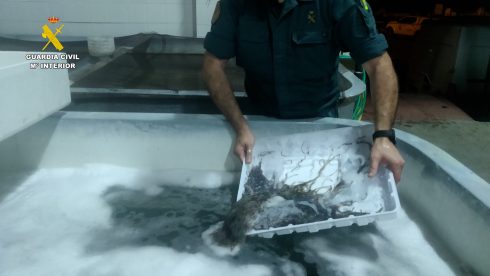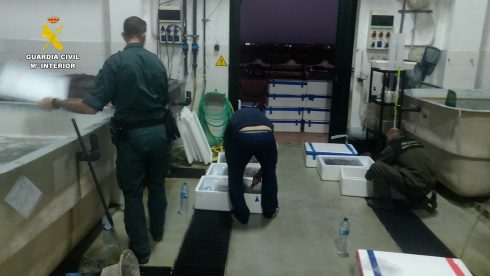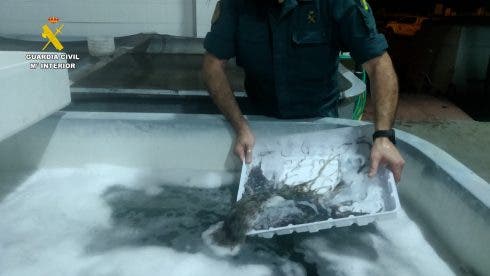THE recent arrest of two men trying to smuggle 190 kilos of elvers through the port of Algeciras has once more thrown the spotlight of this unusual but highly lucrative international contraband trade.
In the latest incident, border agents stopped a vehicle coming from Tangier in Morocco.
Inside it they found coolboxes filled with the live baby glass eels – 192 kilos of them with a value of an astounding €250,000.
It was the largest haul ever found of elvers at an Andalucian port.

Since 2010 all imports and exports of live or processed glass eels in the EU have been banned.
Authorities had decided that it was not possible to successfully regulate the international trade in the endangered species – so they simply bannned it
But the high value of the creatures in the Asian markets has encouraged a rise in criminal gangs trading illicitly in the eels and flying them to the Far East.

Many end up in China to be fattened and then sold on to other countries including Japan where they are a highly prized delicacy.
Spain – itself a major breeding gound for the glass eel – has become a hub for the illegal trade, with elvers ‘harvested’ from across Europe – and it would now appear from Northern Africa as well – being sent to Spain for onward shipment to Asia.
The eels are transported in sealed polystyrene boxes which contain specially prepared trays to prevent the eels from slipping out of the packaging during transport.
They are then carried by ‘mules’ on scheduled flights in checked in suitcases.
It may sound like a crazy amateurish scheme, but the trade is worth millions.
The Olive Press has previously reported on the vast profits available.
Two years ago a man was convicted of smuggling an estimated €62.5 million worth of critically endangered baby eels from Spain to East Asia via the UK.
Gilbert Khoo, 67, from Parbury Rise, Chessington, was found guilty at Southwark Crown Court of six offences relating to the illegal importation and movement of the rare elvers.

UK Border Force officers found the European glass eels, known as Anguilla, concealed under a load of chilled fish at Heathrow Airport.
They were due to be exported to Hong Kong on February 15, 2017.
It was the first such seizure ever recorded in the UK.
The live consignment, weighing around 200 kilos had been transported from Spain to the UK.
The creatures have since been returned to the wild. Khoo was given a two year suspended jail term.
The issue of exporting glass eels to Asia has had the spotlight thrown on it by Europol campaigns.
Gangs based in Spain appeared to be at the centre of the criminal enterprise that is thought to have netted millions from the illegal export of what has been termed a critically endangered species from sources all across Europe.
In Operation Lake the Guardia Civil, coordinated by Europol, arrested 16 people from four different organised crime groups.
One of the rings, based in northern Spain, brought glass eels from France to Spain and then sent them by taxi to Portugal.
Once in Portugal, the criminals put the eels into suitcases, ready to export them by plane.
Another crime organisation, based in Madrid, shipped higher quantities of glass eels declaring them as other types of fish, seafood and sending them later by air cargo.
The seized species had a market value of €600,000.
Spanish authorities estimate that the four criminal organisations under investigation may have made more than €6 million a year from the illegal operation.
In the British case, Khoo was arrested on February 23, 2017 when he disembarked a flight from Singapore at Heathrow Airport.
Investigators found that Khoo would import elvers from EU states, hold them at a farm in Gloucestershire, then repackage and label them as ’chilled fish’ to be sent onwards to East Asia.
Elvers fetch more than 10 times the price on the East Asian black market than they would in the UK.
There they are considered a delicacy and demand is very high.
Due to their status as an endangered animal there are strict controls on their export.
NCA investigators estimate that in two years Khoo exported or had attempted to export 1,775 kilos of eels with an estimated value of €62.5 million on the black market.
NCA Senior Investigating Officer Ian Truby said: “The profits to be made from illegally smuggling live eels to Hong Kong and the Far East are significant.
“But, the NCA are determined to protect vulnerable wildlife from criminals who wish to benefit financially.”
READ MORE:

